Red Cocaine: The Drugging of America and the West – Joseph D. Douglas – Chapter 2
Chapter 2: Soviets Decide to 'Compete'
Buy: https://www.amazon.com/Red-Cocaine-Drugging-America-West-dp-1899798048/dp/1899798048
Publisher: Edward Harle Limited; 2nd edition (June 1, 1999)
Please support the creation of important audio books and articles via:
Paypal: paypal.me/mario1337
Bitcoin: 35iDtUzZq33CoJhmK38TdV9Xunvs7TKmzX
Ethereum: 0xf396A0e10911b4BC975CfE80117412D484B24d1e
I found a way to produce books in a decent quality automatically a lot faster, but the web service produces costs while layout and creation of the videos use up a lot of time. Thank you!!
The book shows how international communism has used opium and cocain as a powerful weapon against the West. Dr. Ray S. Cline, Ph.D., a former Deputy Director for Intelligence for the CIA, said: "A powerful and well-documented case of a deliberate policy decision, first by authorities in Beijing and then in Moscow, to contribute to the decay of American society."
References to Chapter 2:
1 The Administrative Organs Department is one of the two or three most important departments of the Central Committee. This department has responsibility for the Ministry of Defence, Ministry of Interior (KGB), and the Ministry of Justice. It is the most important department insofar as defence, intelligence, and deception are concerned.
2 In Congressional testimony and in official reports of the Narcotics Division of the US Treasury Department, the Korean War is described as having 'been financed solely from the sale of illicit narcotics'. Lasky, Red China's Secret Weapon, op.cit, page A2176.
3 The most significant briefing, which took place in 1956, included Dr Dufek, Colonel-General Miroslav Hemalla of the Military Health Administration, who later became a general and head of the Military Health Administration, Colonel Dr Plzak, whose specialty was the central nervous system and who practiced at the experimental hospital in North Korea, and several other medical specialists.
4 See, for example, John Ranelagh, The Agency: The Rise and Decline of the CIA (New York: Simon and Schuster, 1986), page 215, and US Senate, Select Committee to Study Governmental Operations with Respect to Intelligence Activities, Foreign and Military Intelligence: Book 1 (Washington, D.C.: US Government Printing Office, April 26, 1976), pages 392-393.
5 CIA concern about Soviet, Chinese, and North Korean use of LSD and other drugs in mind-bend-ing experiments became real during the Korean War. The concern was apparently valid and justified but there was a lack of understanding of the dimensions and objectives of the Communist programs. Unfortunately, this concern led to the tragically aberrant experimentation by US intelligence which surfaced during the Congressional hearings of 1975-76. See, for example, US Senate, Final Report of the Select Committee to Study Governmental Operations with Respect to Intelligence Activities, Foreign Intelligence, Book 1 (Washington, D.C.: US Government Printing Office, 1976), pages 392-420.
6 Soviet interest in the use of drugs goes back to the mid-1930s, when the Soviets were experimeriting with drugs as a revolutionary tool. One particularly interesting example of the use of drugs in this respect is reported by A. H. Stanton Candlin. He states that in 1934, the Comintern experimented with the use of marijuana in New York City to stimulate student radicals against the New York police. The behaviour of both drugged and undrugged youths were compared.
7 The use of drugs during the Korean War, while serious, was not as widespread as it was during the Vietnam War. Indeed, many people who served in the war were not aware of the problem, which tended to be more marked in specific locations than in others. For example, one area identified by a former counter-intelligence specialist where the use of hard drugs was especially noticeable was among the stevedore battalions in Pusan.
8 US medical personnel also identified cardiovascular damage among young US servicemen. Thev attributed the cause to diet. The Soviet doctors, too, recognised the possible contribution of diet, hut additionally noted the equally possible contribution of drug usage among the US servicemen. It was this latter possibility that captured Khrushchev's imagination.
9 How much the Soviets knew about the effects of drugs in the mid-1950s is not known. It does appear that because of their interest in, for example, mind-control and the use of drugs to stimulate revolutionary activity, they might well have known much more than was known in the free world.
10 This would probably refer to Soviet experience in using drugs to stimulate and otherwise further revolutionary activity and to the experience of their intelligence services in using drugs to extort and bribe foreign officials. Considerable expertise had also been gained from extensive experimentation with drugs for mind-control purposes.
See video for further footnotes.
#drugs #ussr #communism
-
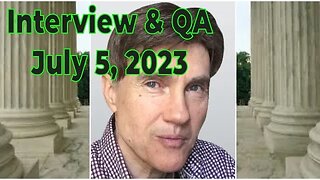 44:39
44:39
Eugen Richter Audiobooks
10 months agoJeff Nyquist Interview & QA July 5, 2023 • John Moore Show
913 -
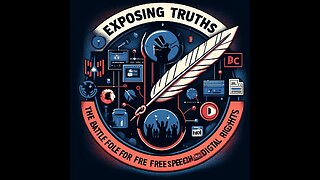 1:03:27
1:03:27
Talk Nerdy 2 Us
8 hours agoExposing Truths: Julian Assange's Battle and the TikTok Conspiracy
41.7K6 -
 1:58:50
1:58:50
Laura Loomer
10 hours agoEP47: Georgia GOP Rocked With Anti-Trump Scandal Ahead of State RNC Convention
70.5K89 -
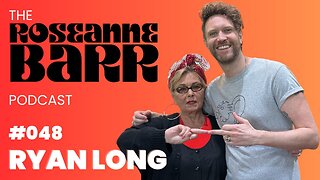 2:20:49
2:20:49
Roseanne Barr
11 hours agoWe finally got Ryan Long!!!! | The Roseanne Barr Podcast #48
75.3K93 -
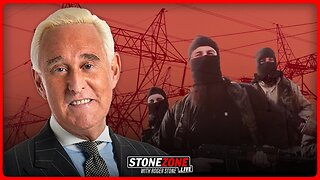 1:01:06
1:01:06
The StoneZONE with Roger Stone
13 hours agoWill Terrorists Take Down America's Power Grid? With Glenn Rhoades | The StoneZONE w/ Roger Stone
62.5K28 -
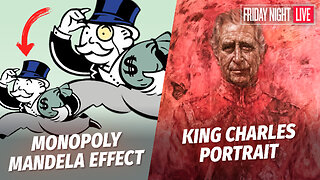 1:03:58
1:03:58
Edge of Wonder
13 hours agoAce Ventura: Mandela Detective, King Charles Portrait & Weird News
62.8K60 -
 1:40:05
1:40:05
The Quartering
17 hours agoWhy Modern Women Suck w/Hoe_Math
93.4K54 -
 1:43:26
1:43:26
Robert Gouveia
13 hours agoGarland SHAKING over CONTEMPT; Congressional MELTDOWN; Fani RAGES at Senate; Tish INVESTIGATED
86.4K100 -
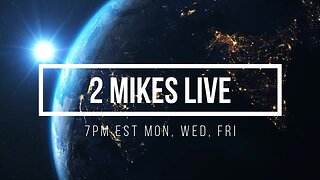 1:48:05
1:48:05
2 MIKES LIVE
14 hours ago#67 2ML Open Mike Friday, we have a LOT to talk about!
50.9K6 -
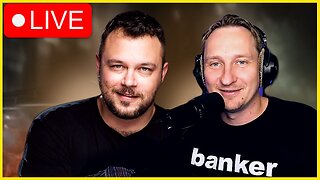 2:27:40
2:27:40
WeAreChange
14 hours agoIt’s NOT Just The Frogs — They’re Turning All The Animals GAY??
86.7K35